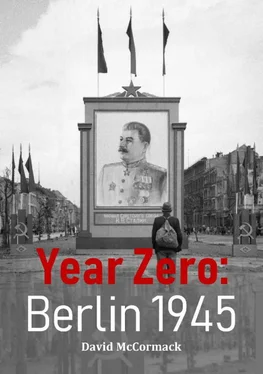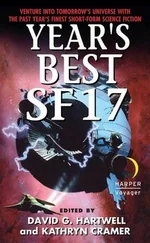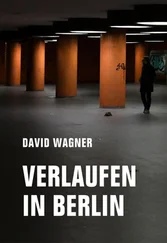Shortly before the scheduled military conference, Hitler emerged from the depths of the bunker into the chancellery gardens to meet a group of Hitler Youth members who were to be awarded decorations for knocking out Soviet tanks. The trembling in Hitler’s left arm meant that he was unable to present the awards personally. After giving a brief speech, he returned to the bunker for the military conference. By this time Goering had arrived, his huge bulk necessitating that he was given a seat opposite Hitler. As the conference dragged on, Goering had increasing difficulty in camouflaging his restlessness. The minutes slowly ticked by, Goering’s anxiety no doubt increasing as he wondered if the road to the south was still open. Eventually, the conference ended, the only concrete decision made being the confirmation by Hitler that the German command structure would be split into a northern command headed by Grand Admiral Karl Doenitz, and a southern command headed by Field-Marshal Albert Kesselring. Goering left immediately after the conference was adjourned, claiming ‘urgent tasks in South Germany’. Hitler looked right through him as if he no longer existed. Albert Speer, the talented and ambitious Minister of Armaments was also present at the conference where he noted, ‘a sense of being present at a historic moment’. Later that day, he left Berlin along with the leader of the Labour Front Dr Robert Ley, and the arrogant Foreign Minister Joachim von Ribbentrop.
Himmler also left that day as he had his own urgent business to attend to. After a brief stop at his headquarters at Ziethen, he was driven to Gut Harzwalde to see Masur. Kersten was waiting as the car drew up in the pouring rain in the early hours of 21 April. Masur later recalled Himmler’s arrival:
During the course of the evening, we received a telephone call to tell us that Himmler would not come until around 2:30 am. We were sitting in the living room by candlelight, as the electricity, as always during air raids, was turned off. I was greatly worked up. Would this man, who was the real ruler of Germany, whose days however were numbered, appear as a man at the top of his power or would he already reflect the shadow of defeat? I was excited at the thought that in a few minutes I would be face to face with one of the greatest murderers of the Jewish people.
At exactly 2:30 we heard the noise of a car arriving. Kersten went outside, and after a few minutes, Heinrich Himmler entered, followed by Brigade Commander Schellenberg, adjutant Dr Brandt, and Kersten. In spite of my inner excitement, I appeared outwardly perfectly cool. Himmler greeted me with ‘Guten Tag’, instead of ‘Heil Hitler’, and conveyed his satisfaction at the fact that I came to see him.
We sat at a table, which was set up for coffee for five persons. Himmler was dressed impeccably in his uniform with the insignias of rank and shiny decorations. He looked well groomed, seemed fresh and lively in spite of the late hour, outwardly quiet, and in control. He looked better in person than in photographs. Perhaps his beady eyes and piercing gaze was an expression of sadism and harshness, however, had I not known his past, I would never have believed that this man was singularly responsible for the most extensive mass murders in history.
Indeed, Himmler went out of his way to appear cooperative. After telling Masur how happy he was to see him, Himmler opened the discussion by saying, ‘I want to bury the hatchet between us and the Jews. If I’d have had my way, many things would have been done differently’. He then went on to offer a feeble defence of the Nazi policies:
In our Generation, we have not known any peace. When the First World War began, I was 14 years old. The war hardly ended when the Civil War began, and the Jews were deeply involved in the Spartacist revolt. The Jews were a foreign element in our midst, which always evoked irritation… After coming into power, we wanted to settle this issue once and for all, and I was in favour of a humane solution through emigration. I conferred with American organisations, to arrange for a quick emigration, but even countries who claimed to be friendly toward the Jews did not want to admit Jews…
Then the war brought us into contact with the Jewish masses of the East, who were mostly part of the proletariat. Because of this, many new problems arose. We could not tolerate such an enemy at our backs. The Jewish masses were infected with many diseases, especially typhoid fever. I lost thousands of my SS troops through these diseases. Also the Jews were helping the partisans.
This litany of self justification for the worst crimes in history went on and on, much to Masur’s growing sense of exasperation. Nonetheless, he somehow kept his nerve and was able to stem Himmler’s flow of self pity by suggesting that he release prisoners in order to gain some credibility with the Anglo-American Allies. Himmler took the bait and agreed to the release of 1000 Jewish women from the concentration camp at Ravensbruck.
It was significant, that Himmler wanted the freed prisoners designated as Polish, Masur noting that, ‘He did not want to create any friction between himself and Hitler on account of the Jews’. Even now, Hitler’s most trusted paladin was treading carefully with the implementation of his treasonous activities. The meeting ended at 05.00hrs, by which time Schellenberg was becoming increasingly anxious regarding Count Bernadotte who had been left waiting at Hohenlychen. Himmler bade farewell to Masur, after which he walked outside towards his car with Kersten. To his most trusted confidante he then said:
Oh! Herr Kersten, we have made serious mistakes. We wanted greatness and security for Germany and we are leaving behind us a pile of ruins, a crumbling world. But it is still true that Europe must rally to a new standard, else all is lost. I always wanted what was best, but very often I had to act against my real convictions. Believe me Kersten, that went very much against the grain and it was bitter to me. But the Fuhrer decreed that it should be so, and Goebbels and Bormann were a bad influence on him. As a loyal soldier I had to obey, for no state can survive without obedience and discipline. It rests for me alone to decide how long I have to live, since my life has now become meaningless. And what will history say of me? Petty minds, bent on revenge, will hand down to posterity a false and perverted account of the great and good things which I, looking further ahead, have accomplished for Germany. The blame for many things which others have done will be heaped on me. The finest elements of the German people perish with the National Socialists; this is the real tragedy. Those who are left, those who will govern Germany, hold no interest for us. The Allies can do what they like with Germany.
Kersten, I thank you from the bottom of my heart for the years in which you have given me the benefit of your medical skill. My last thoughts are for my poor family. Farewell!
The parting with Kersten betrayed the extent to which Himmler was fatigued by his own intrigues. With his enthusiasm visibly waning, he set off for the delayed meeting at Hohenlychen.
Himmler arrived at the sanatorium at 06.00hrs in time for breakfast with Bernadotte. His fatigue must have been evident as he explained to Bernadotte that he had hardly slept at all for the past few nights. Following breakfast they proceeded to discuss the proposed humanitarian measures, including Bernadotte’s suggestion that released Scandinavian prisoners be allowed to continue their journey from Denmark to Sweden. Himmler refused this reasonable request. Bernadotte however continued to press the issue, later recalling:
…I again put forward the request that the Scandinavian prisoners, who were at the time being transported to Denmark, should be allowed to continue the journey to Sweden, but Himmler once more refused. Schellenberg subsequently told me that Hitler had again forbidden any concession on this point.
Читать дальше












